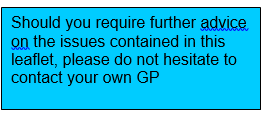- Reference Number: HEY447/2023
- Departments:
- Last Updated: 30 September 2023
Introduction
This leaflet has been produced to give you general information about your recovery. It is not meant to replace the discussion between you and your doctor, but may act as a starting point for discussion. If after reading it you have any concerns or require further explanation, please discuss this with a member of the healthcare team who has been caring for you.
General Advice
Many people are surprised at the length of time it takes to get over an operation even if it is fairly minor but time, nature and a bit of determination are usually effective.
Do not be afraid to ask for advice, however small your worry may seem. A few words can often save a lot of anxiety.
Most people feel rather tired and insecure when they first go home and are frustrated by not feeling able to do all the things they want. Do not worry if this happens to you as it is quite normal. Instead, make a plan of gradually increasing the things you do by yourself over the following weeks.
It is often helpful to plan a ‘rest time’ during the day when you can be undisturbed. On the whole, resting on your bed rather than in a chair is more relaxing. If possible, let your friends and relatives know when you will be resting so that they will not call or telephone during this time.
Pain Control
Adequate pain control is essential to help you recover following your surgery.
If you do not have suitable analgesia (painkillers) at home you will be supplied with appropriate analgesia on discharge. Advice will be given by your care team.
Wound Healing
All wounds progress through several stages of healing and you will be able to see changes in your wound. The following points are normal and are frequently experienced:
- 1. Unusual sensations such as tingling, numbness or itching
- 2. A slightly hard lumpy feeling as the new tissue forms
- 3. Slight pulling around the stitches as the wound heals
Remember – do not pull off any scabs as they protect the new tissues underneath and act as ‘nature’s dressing’. They will fall off without any help when ready.
Remember – gentle massage around the wound will help to stop the new tissue ‘sticking’ to the underlying structures, particularly if your wound lies over a hard surface such as bone.
Seek help from your GP if the amount of pain in your wound increases, if the amount of redness and/or swelling increases and if there is any discharge from your wound.
Bathing and Showering
It is quite safe to get your wound wet two or three days after your operation (unless otherwise advised). There is no evidence to show that adding salt to the bath aids healing and in some cases it can make your skin feel dry and uncomfortable.
Some people feel a little insecure when they first get into and out of the bath. A bath mat helps cut down the risk of slipping. A towel hooked around the taps can be helpful in pulling yourself up.
Many people feel more secure if there is someone else in the house when they take their first bath or shower, even if actual help is not needed.
Clothing
Loose clothing is generally more comfortable and track suits are very suitable – try to avoid tight belts. Close fitting underwear, particularly if it has seams that could rub, should also be avoided.
Sleeping
Changes in routine and restricted movement can cause difficulty in sleeping. Some people are woken by wound discomfort caused by sudden movement. If this does occur it may be helpful to take a painkiller at bedtime.
Eating
Your healthcare team will advise you if you need any special dietary changes following your operation. Generally foods high in carbohydrates and fibre and low in fat are best for you. If you are in any doubt about the right sort of food to eat ask your healthcare team for advice.
Some people find that their appetite is small and they get a ‘bloated’ feeling or indigestion after meals. These symptoms usually clear up by themselves as you become more active. Small meals, taken regularly, can reduce the likelihood of these symptoms occurring.
Alcohol is not advised following surgery as it can interact adversely with your medications.
Bowels
Changes in diet, activity and the use of some drugs especially painkillers can lead to irregular bowel habits but this usually corrects itself with time. Straining can be uncomfortable particularly after abdominal surgery and it may be helpful to take a mild laxative. However, if you have a stoma you will require specialist advice from your stoma care nurse about diet and laxatives. If you are in any doubt about this ask your doctor or a member of your care team for advice.
Exercise
A gradual increase in the amount of exercise you take is helpful, starting with a short walk two or three times a day and increasing the distance over the next few weeks.
If specific exercises are needed, ask before you leave hospital. Most people find it more comfortable to sit in a high chair as it can be difficult getting up from a low seat.
Climbing stairs can be surprisingly tiring but is a useful way of getting exercise and judging your progress. Some people find it easier to go up backwards on their bottom initially.
If you take regular exercise, swim or attend a gym, ask your care team for advice for when you can resume these activities.
Household Jobs
The sort of movements that can cause discomfort are bending or stretching (e.g. reaching high or low shelves), lifting heavy weights (including small children) and pushing or pulling (such as vacuuming or mowing the lawn).
Similarly, standing for long periods (e.g. washing up or cleaning vegetables) can be tiring.
It is very useful if help is available for the first one or two weeks after discharge.
Sexual Relations
There is no rule about the time at which you can resume your usual sexual relationships. As a rough guide, by the time you are ready to resume your normal daily activities, sexual relations can be resumed unless you have been directed otherwise by your consultant. Some people may feel ready earlier.
Ask for advice if your operation is related to this area or if you are concerned about resuming your usual contraceptive methods (especially the pill).
Work
The time at which you can return to work depends on both the type of operation and what your job is. It is better to feel completely well before you return as many people feel tired and find concentration difficult to start with. More specific advice can be given either by the hospital staff or your local surgery.
Driving
The time at which you can safely start driving varies a great deal with the type of operation you have had. Ask for specific advice from your healthcare team but do remember that your movement and strength must be up to coping with an emergency stop as well as normal driving. Also some drugs affect concentration especially strong painkillers.

This leaflet was produced by the General Surgery Department, Hull and East Yorkshire Hospitals NHS Trust and will be reviewed in September 2026
General Advice and Consent
Most of your questions should have been answered by this leaflet, but remember that this is only a starting point for discussion with the healthcare team.
Consent to treatment
Before any doctor, nurse or therapist examines or treats you, they must seek your consent or permission. In order to make a decision, you need to have information from health professionals about the treatment or investigation which is being offered to you. You should always ask them more questions if you do not understand or if you want more information.
The information you receive should be about your condition, the alternatives available to you, and whether it carries risks as well as the benefits. What is important is that your consent is genuine or valid. That means:
- you must be able to give your consent
- you must be given enough information to enable you to make a decision
- you must be acting under your own free will and not under the strong influence of another person
Information about you
We collect and use your information to provide you with care and treatment. As part of your care, information about you will be shared between members of a healthcare team, some of whom you may not meet. Your information may also be used to help train staff, to check the quality of our care, to manage and plan the health service, and to help with research. Wherever possible we use anonymous data.
We may pass on relevant information to other health organisations that provide you with care. All information is treated as strictly confidential and is not given to anyone who does not need it. If you have any concerns please ask your doctor, or the person caring for you.
Under the General Data Protection Regulation and the Data Protection Act 2018 we are responsible for maintaining the confidentiality of any information we hold about you. For further information visit the following page: Confidential Information about You.
If you or your carer needs information about your health and wellbeing and about your care and treatment in a different format, such as large print, braille or audio, due to disability, impairment or sensory loss, please advise a member of staff and this can be arranged.

